alice / they/them / (kr) musicals, vocals, language learning
Don't wanna be here? Send us removal request.
Text
[Translation] INTERVIEW: Sing for My Music: The Phantom of the Opera’s Kim Ju Taek
Interviewed by Ahn Se Young From the March 2023 issue of The Musical Translated by @anywaythewinds, edited by sigye
source
Translator's note: Thanks to sigye for their help reviewing and editing this. Please message me if you find any mistakes. Please do not quote without credit (link to this post).
Just like the first scene of The Phantom of the Opera when we see time turned back through a fallen chandelier pulled back to its place hanging from the ceiling, let’s turn back the clock to 2009. The year The Phantom of the Opera returned for its second season in Korea, Korean baritone Kim Ju Taek made his opera debut as Figaro in The Barber of Seville in faraway Italy. He then traveled all over the world, performing as an opera singer, until 2017 when he suddenly appeared on musical competition TV show Phantom Singer 2 and took on a new challenge as a part of crossover musical group, Miraclass. Now, in 2023, Kim Ju Taek of Phantom Singer 2 is about to transform into a real Phantom in The Phantom of the Opera, returning for its first Korean production in 13 years. Opera star Kim Ju Taek receives the spotlight of the stage, while the Phantom hides in the dark basement of an opera house. These two characters that live in seemingly different worlds become one through a common desire to share their music with the world.
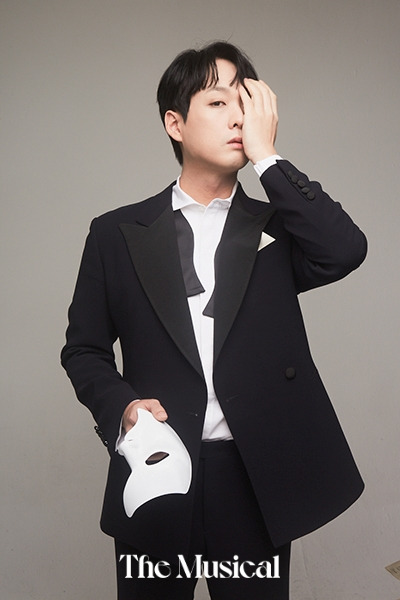
“I knew I couldn’t pass on this opportunity”
You were actively performing in Italy, the birthplace of opera, when you decided to appear on Phantom Singer 2, and there was a lot of talk about you. I heard that some of your family and friends even discouraged you from doing TV. How did they react when they heard you would be making your musical theatre debut? When I told my mother I was going to be on Phantom Singer 2, she had to go lie down from shock. To be honest, I was afraid she would react similarly this time as well so I kept Phantom a secret from my mother until just before the cast was announced. But when she heard the casting news, her reaction was completely different from the past. Instead of opposing it, she even asked me this and that about the musical with interest. Genre aside, perhaps she saw that I was appearing alongside distinguished actors such as Jo Seung Woo, Choi Jae Rim, and Jeon Dongseok, and thought, “My son must be doing something amazing!” (laughs) The Miraclass members were also very happy for me. Musical actor Park Kang Hyun sunbaenim [senior] told me that it was a role that I would fit very well and congratulated me. (laughs)
I heard that you went to see pretty much every musical that actor Park Kang Hyun appeared in. When did you start becoming interested in musicals? Before I appeared on Phantom Singer 2, I honestly thought that classical music was the only type of music for me. Like a racehorse with its eyes covered, my view was too narrow. But through Phantom Singer I met so many skilled musicians that performed in other genres, and I discovered there was a whole other world I was unaware of. It was a wakeup call. “I was too proud just because I sing a bit of opera!” I thought, and I realized I had the wrong view before. From that time, my eyes were opened, and I became interested in a variety of genres. Through the competition, I became a member of the same team as musical actor Kang Hyun, and I started learning about musicals when I went to support him in the musicals he appeared in. I’ve pretty much seen all of the musicals he’s been in from when he was at Daehakro in 2017 doing Evil Dead to the present day in grand theatres.
As a member of the audience, what did you think of musicals? I went to study abroad in Italy in my last year of high school, so I didn’t have any opportunity to learn about musicals. Musicals aren’t performed much in Italy, the birthplace of opera. I discovered musicals late, once I returned to Korea, and it was overwhelming. The stage direction was awesome, and the actors’ singing was powerful to my ears - a completely different appeal from opera, which doesn’t use mics. I’ve never learned acting, but I thought that I would like to try performing in sung-through musicals such as Les Miserables and Hadestown. I also wanted to try singing the songs that An Jung-geun sings in Hero. I sometimes imagined what appearing in a certain musical would feel like. One of the musicals that I vaguely dreamed of was The Phantom of the Opera.
When the cast was announced, you said, “I have thought that if I ever were to be in a musical, the musical that would best express my music would be The Phantom of the Opera.” What was the reason that made you decide to appear in Phantom? Even amongst classical singers, The Phantom of the Opera is a well known musical. It’s set in an opera house in Paris, and many opera singers have appeared in the show as well. I’ve never seen the show in person, but I’ve sung Raoul and Christine’s duet, “All I Ask of You,” at a concert before. From then, I’ve thought that the show had very beautiful music. I was also curious what the secret was behind Broadway’s longest running musical. I wanted to figure out the reason for its success through performing in the musical myself. More than anything, it’s also the first time in 13 years that The Phantom of the Opera is being produced in Korea! We don’t know when the next production after this will be, so I knew I couldn’t pass on this opportunity.
Considering that this is the first license production in so long, the casting competition must have been fierce. Do you have any stories from the audition process? The auditions were held when people couldn’t freely enter and leave the country due to COVID-19, so the director, Rainer Fried, couldn’t come to Korea himself and ended up video calling into the auditions. The audition song was “All I Ask of You (Reprise),” when the Phantom peers at Christine and Raoul’s secret rendezvous and sings of his feeling of betrayal. I was so nervous that I don’t even remember how I sang the song. But after I sang, the director asked me to focus more on the Phantom’s emotions and sing it once more, so I had a hunch it was going well, since it meant that he was interested in me. The first time I sang in front of the director was during rehearsals, and he said that now that he was hearing me in person, it was a hundred times more thrilling than during the video call auditions. The producer that was at the auditions also said that I was memorable. They said that they usually just keep their eyes on their laptop screen, but for the first time at any audition, they looked up after I sang my first line. To be honest I don’t remember anything except being super nervous, but I was a little shy hearing such praise.
Were you really that nervous? Even though musical theatre is a new genre to you, you’re skilled in singing so I thought you would be confident. I definitely wasn��t confident at first! First of all, Phantom’s songs have a lot of high notes. In opera, the highest notes a baritone has to sing is around F# or G, but Phantom has to sing G#s and even A. I also have to use falsetto for some parts, which opera singers usually don’t need to do, since opera singers have to sing powerfully enough to cut through the orchestra and be heard without mics. But since musical vocalization is different from opera, I felt some pressure there. I debated a lot about how to sing in the show, and I ended up mixing in just the right amount of opera vocalization during rehearsal. Thankfully everyone seemed to think it was okay. (laughs) From that point, I gained some confidence.
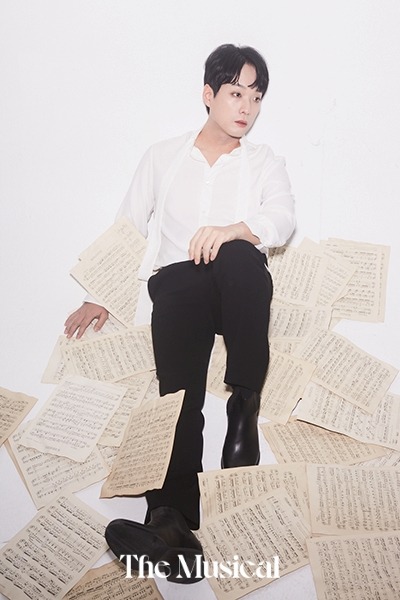
“I want to break the stereotypes about opera singers”
Did you find any big differences between musical theatre and opera while rehearsing? As I said before, since opera singers don’t use mics, if you sing softly your sound is completely buried by the orchestra. It’s really embarrassing if you’re an opera singer and a conductor says your voice is soft. But in musical theatre, through the mic, even the smallest whispers and breaths from an actor is perfectly conveyed to the audience. So compared to opera, a much more subtle expression is possible. On Phantom Singer 2, Kang Hyun nicknamed me “tyrannosaurus” so a lot of people remember me as just having a powerful voice, but I actually enjoy more subtle singing, with expressiveness. In that sense, I think musical theatre fits me well.
In the past, you sang mostly in Italian when performing in operas. This time, you’ll be performing in front of a Korean audience singing in Korean - it must be a new feeling. You might think that it’s easier for me to sing in Korean, but that’s not the case. First of all, during rehearsals, the Korean lyrics were constantly being edited, so I would confuse the lyrics with the version I’d previously memorized. However, opera lyrics never change, and it’s required to arrive at rehearsals with the score memorized, so I’m still getting used to the rehearsal process for Phantom. The Korean language doesn’t have distinct accents or intonation, which is also an obstacle. European languages all have set rules for pitch and intonation, so you can sing according to those rules, but Korean doesn’t have those rules. So classical singers find Korean songs harder than Italian, German, or English language songs. But it’s fun, since a song sounds completely different based on the points that the singer chooses to emphasize in their interpretation.
Do you feel nervous about the acting? I would’ve been nervous if there were a lot of spoken lines, but The Phantom of the Opera is a sung-through musical. Putting emotions into my singing is something I’ve already been doing from my opera days, so it’s not too hard, comparatively. A lot of people have this misconception that opera singers wait for their turn, sing their song, and then get off stage, but operas are also just like musicals and require acting skill. I want to break that stereotype about opera singers by doing well as the Phantom.
The role of Christine is played by Son Ji Soo and Song Eun Hye, who are also opera singers. How did you feel performing with them during rehearsals? Even before Phantom, I knew both of them well. Soprano Ji Soo and I are both graduates of Seonhwa Arts High School and we’ve run into each other before at competitions. Popera singer Eun Hye and I performed together at a concert before. The fact that the two of them are also a part of this is a source of strength for me, since we can talk about our troubles together as classical singers doing musical theatre. The two Christines must feel a lot of pressure regarding acting since the role has so much stage time, but the others playing the Phantom role are all musical actors so they’ve been taking the lead during rehearsal, and now we have a great time practicing together. I’ve been enjoying rehearsals because each of the Christines have their own personalities. Since Ji Soo has her share of experience on the opera stage, she gives off the vibe of a respectable prima donna; Eun Hye, on the other hand, brings out a more young and innocent side of Christine, one that’s just about to become a big star.
Imagine yourself finally standing on stage after all the rehearsals - which scene do you anticipate the most? The scene where the Phantom sings “The Music of the Night.” After starting rehearsals, we pretty much rehearsed this song for ten days straight, but I understand why we poured our heart and soul into rehearsing it. In just a few minutes, I have to fully express what kind of person the Phantom is. To the Phantom, music is his entire life. He’s devoted his entire being into his music. And one day, someone appears that can transform the music he’s been dreaming about into reality. That someone is Christine. Right before the Phantom sings “The Music of the Night,” he sings this to Christine: The only reason I’ve brought you here is so that you can sing my song. If I don’t properly convey the Phantom’s mentality in this passage, the Phantom could be just a villain in the audience’s eyes. So I’m very nervous about this scene, but I’m also excited for it. It feels like time stops when I’m singing this song.
“The Music of the Night” requires a detailed portrayal, but the Phantom’s face is covered so it must be difficult to convey emotion in this song. That’s right. My face is half covered by the mask, so however intensely stare, there’s a limit to what the audience will take away. Instead, I use my hand movements to convey emotion. In “The Music of the Night,” the Phantom’s motions are gentle and careful as if he’s lulling a baby. Because Christine is that precious to him. But strength must coexist with that gentleness - only then can the audience see that Christine is overpowered by the Phantom. The director said that I have to act with “the feeling of pulling Christine’s backbone.” It’s a bit of an extreme expression, but that’s how I have to portray the Phantom’s invisible power that’s able to captivate Christine. As rehearsals continue, I’m realizing just how exquisitely and systematically this musical was put together. I can’t carelessly pass over any single breath, look, gesture, or word. I think the reason why The Phantom of the Opera has been so loved all over the world for 35 years is because of this meticulous attention to detail.

“If all you do is think, nothing will happen”
With the guidance of the Phantom, Christine emerges as the prima donna. In real life, do you have a mentor like the Phantom? Though I’ve never met him, there’s someone that held on to me so that I could make it to this point without losing my passion for singing - Italy’s legendary baritone Piero Cappuccilli. Cappuccilli was famous for his ability to sing up to the tenor range, even though he was a baritone, and his long, uninterrupted phrases. I especially love his legato [the method of singing multiple notes in a smooth, continuous fashion]. There’s an aria from the opera Don Carlo called “Io Morro, Ma Lieto In Core” that Rodrigo sings before he dies. In this aria, Cappuccilli sings four phrases without a single breath in between for about 20 seconds. When I heard him sing this, I was floored. I wanted to copy him so at night I would go to the park when it was empty and walk while practicing singing. In this way, I was able to sing for longer on a single breath. That’s how I grew as a singer while listening to Cappuccilli. He’s my idol and mentor. Whenever I want to go back to the basics, I watch videos of Cappuccilli. If the Phantom reached out to Christine through the mirror to guide her, Cappuccilli did the same thing to me, through the computer screen.
The Phantom is a musical genius, but due to his hideous appearance he leads a lonely life hidden in the basement of an opera house. Though you’re known for having an optimistic personality, do you find any similarities between you and the Phantom? For any character I portray, I start with finding the similarities between my experiences and the character’s in the story. For example, if the role is a father who has lost a wandering son, then I’ll recall the feeling of when one of my favorite juniors lost their way to portray that role. While I was carefully considering where to find the commonalities between myself and the Phantom, my slump in Italy came to mind. After 4-5 years studying abroad, due to my family’s circumstances, it became difficult for my parents to support me. To make matters worse, I was deeply betrayed by someone in my life. As a twenty something year old living alone far from home, I struggled to get through these hardships one after another. I wanted to give up on the music that had been my everything up until then. I even had the extreme thought of giving up on life. I’m going to try and place those feelings into my Phantom. The Phantom’s solitude, his feelings when Christine, who he believed would give his music wings, betrays him - I think my experiences will help me portray those emotions.
How did you get out of that slump back then? Ironically, it was music that pulled me out of my slump in the end. At the time, my final exam to graduate from the Verdi Music Conservatory in Milan was approaching, but I had lost myself to a state of despair and I even stopped attending my classes. But then, a teacher of mine came to look for me, and even brought me to their villa to cheer me up. They also helped me enter a competition, and it was at that competition that I met the casting director that cast me in my debut opera. It’s dramatic, right? After that, while preparing for the opera, I forgot about all of the hard times. I also graduated from school as the fourth student in the conservatory’s history to receive unanimous votes. I almost gave up on life because of music, but it was also thanks to music that I hung on to life.
I always thought you had a continuous upward trajectory as an opera star - I’m surprised that you also had setbacks in your career. I’m not sure how I appear to others, but my life has been a continuous cycle of new endeavors and failures. After debuting as an opera star, while I was actively performing, I hit another slump. It was difficult to always sing in the same theatre, with the same people, with the same orchestra and the same repertoire. This question kept ringing in my head: “Is this really the future I dreamed of?” Around this time, I was in Korea for a bit, and coincidentally it was when Phantom Singer 1 was airing. While watching the show, I couldn’t get the thought out of my head, “What if I had appeared on this show?” So when the applications for Phantom Singer 2 opened I immediately applied. Because I had gotten tired of constantly doing the same things in the same way and wanted a refresh.
Is there anything else you want to challenge in the future? After Phantom of the Opera, if possible, I want to keep doing musicals. I intend to grow as a musical actor one step at a time. Later on, I want to be a conductor or a music director. I want the job of seeing the forest instead of the trees - painting the big picture. My childhood dream was to become a conductor. While traveling around the world and performing with conductor Jeong Myung Hoon, I saw his overflowing charisma while conducting and my childhood dream that I had carefully tucked away came back to life. After all, it’s part of my personality that I can’t stay in one place for too long. Just like how 19 year old Kim Ju Taek set off for Italy, I love taking on new challenges. And I’ll do that for the rest of my life.
In the world, there are more people that are afraid and hesitant in front of new challenges than those that enjoy it. What do you want to say to the people that are afraid? I often tell my juniors to not just think of doing something but to actually attempt it. If all you do is think, nothing will happen. However, with anything you attempt, even if you fail, the experience remains. That experience keeps building up and then it becomes your skills. Sometimes, when I’m giving advice to my juniors, they respond with, “I’m not ready yet.” I get sad when I hear those words. If you do nothing and just wait for your big break, when your chance actually appears you won’t be able to take it because you don’t have the skills. You have to remember that no matter if you succeed or fail, the experience you build is preparation so you’re able to take the opportunity when it comes. So if you’re thinking about trying something right now, go for it. It takes ten hits to chop down a tree. If all you do is think about something ten times, nothing will come out of it.
#kim ju taek#김주택#the phantom of the opera#오페라의 유령#korean musicals#translation#i love that even though he's a musical theatre rookie he's bringing such a wealth of experience of performing to the role#like you can feel just how much he loves music and that's why this role is perfect for him
44 notes
·
View notes
Text
[Translation] Excerpts from Jo Seung Woo’s interview after his debut in The Phantom of the Opera
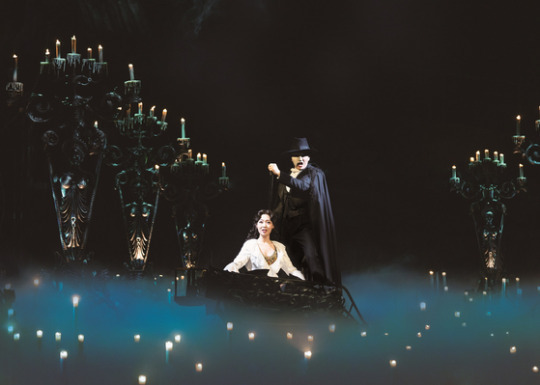
By Jo Yeon Gyeong April 1, 2023 Translated by @anywaythewinds
source
Translator’s note: I mostly translated Jo Seung Woo's words and didn't bother with the fluff from the reporter. Full disclosure that I am not a native Korean speaker, I just study it and translate for fun. Read at your own risk. If you find any mistakes please message me :) also please don't steal or quote without credit (link to this post) thank you
He who overcame his fear and stood on the stage earnestly. The birth of a perfect “Jo Phantom” made all of us cry, including Jo Seung Woo himself.
The Phantom of the Opera, the musical masterpiece of the century, opened at the Busan Dream Theatre on March 30th, the first Korean language production in thirteen years. Jo Seung Woo, who plays the role of the Phantom in The Phantom of the Opera, shared his thoughts to a group of reporters after finishing his first show.
Jo Seung Woo, revealing his inner thoughts on his struggles while preparing for The Phantom of the Opera, said, “I was scared and there were a lot of times I wanted to run away. I thought, ‘Does this role not fit me? Is it too big for me?’ Alone, I was mentally worn out by a lot of these thoughts while fighting these preconceptions I had of myself.”
“But a lot of people, including our Phantom team, gave me a lot of courage. Finally, the show opened, and I stepped onto the stage earnestly. I was very nervous and made mistakes, but I believe I kept my promise to do my best on the stage,” Jo Seung Woo shared.
He also said, “I’m very grateful today for everyone’s support and applause despite my shortcomings. I’ll continue to do my best sincerely. Thank you.”
Jo Seung Woo, who previously described his casting in The Phantom of the Opera as the first page of the second act of his life as an actor, said, “I want to go back to basics to uncover the emotions of this musical, and I want to start this show with the simplest of inspirations. I’ve been a musical actor for more than 20 years, but I don’t know when I’ll ever have the chance to put on the Phantom’s mask again. I will try my best while treasuring this opportunity.”
#happy opening to 2023 kr prod of poto!#조승우#jo seung woo#translation#the phantom of the opera#phantom of the opera#오페라의 유령#cho seung woo#korean musicals
22 notes
·
View notes
Text
[Translation] INTERVIEW: Park Kang Hyun of The Man Who Laughs says, “Gwynplaine, who dreams of a better world, is like me”
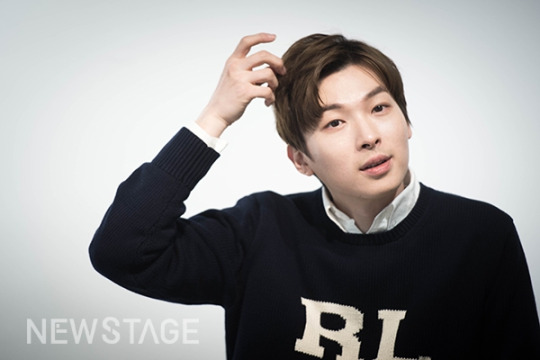
By Park Min Hee February 8, 2020 Translated by @anywaythewinds
source
Translator’s note: This interview was conducted during the second season of The Man Who Laughs, an original production of EMK. Full disclosure that I am not a native Korean speaker, I just study it and translate for fun. Read at your own risk. If you find any mistakes please message me :) also please don't steal or quote without credit (link to this post) thank you
[some minimal notes from me are in brackets]
For the audience members that attended the premiere season of The Man Who Laughs, what do they remember? The cast was irreplaceable; even the most talented actors would have difficulty getting into its ranks. Musical production company EMK invested five years and a record 17.5 billion KRW into the production, saying, “We could not have created anything greater.” For a production of this scale, the casting of Park Hyo Shin and Suho made sense, but the appearance of Park Kang Hyun, who had barely grown out of “rookie” status, was unfamiliar and even brave. Park Kang Hyun says that while at that time it was scary, he now thinks of himself as a rising star working to become an even better storyteller.
How do you feel about doing The Man Who Laughs again? When it was confirmed that I would be in the second season, I definitely felt some pressure to perform better than in the premiere, but I was mostly excited to be doing it again. The order of some scenes got switched around so Gwynplaine’s journey is shown more naturally. I also had a hand in creating this work as a part of the premiere season of an original production, so I contemplated more deeply about the character’s layers. Since some time has passed, aren’t I at least one percent deeper as a person, too? From my love for Dea and my father [Ursus], to my conviction to change the world with my beliefs, I’m experiencing everything more powerfully and deeply. I thought that since it’s a musical that I’ve done before that it would be a lot easier, but it’s much more difficult both physically and emotionally. But I feel that as difficult as it is, the final product turns out a little better, too.
The Man Who Laughs received a lot of acclaim during the premiere season - you must be a bit proud of yourself From the beginning, I poured my soul into this show. I do the same for every show I’m in, but since it was an original production, it was much more challenging. When you’re creating something, it always ends up getting changed, and if you get a better idea it gets changed again. Perhaps because of that process, I’m even more attached to this musical - through this show, I received an award and a lot of people discovered me, so it became a really meaningful piece of work to me.
Are there more reasons to why you felt that this show is physically and emotionally draining? I feel it the most during the curtain call. It’s when I get to say thank you to everyone that came to see the show, but my legs shake so much that I can’t even stand straight. It shows that I’ve really poured my entire being into the show. I’ve never done another show where I’m having such a hard time during the curtain call. Of course it was already a struggle in 2018, but it wasn’t as hard as this time. I think because I know what to do now that I’m putting more of myself into it. I’m pouring my heart and soul into it but I still wonder if what I’m doing is right. Like, is it supposed to be such a struggle? But I shouldn’t feel like I’m already using up all the tricks under my belt, so it really feels like I’m crashing into the stage [to be honest, no idea what he’s trying to say here]. The other Gwynplaines also say it’s hard but I think I’m having the hardest time.
During the premiere season, the other actors casted in the same role as you were extremely popular. Since then, as you’ve done more musicals, you’ve gained more fans and filled more seats - do you feel like you’ve proved yourself with just your skill? It was scary. I try not to feel pressured by it but it’s impossible not to. So I try to do even better, and I also hope that I can seal my place as the actor people think of when they hear about The Man Who Laughs. I’m not sure about what the ticket sales are like, but there should be more people that know who I am now, and there’s even people that watched the movie The Man Who Laughs and then came to the show. It’s cool and I’m very thankful.
It can be said that The Man Who Laughs is EMK’s representative work. It’s clear that in the art world, Korea is raising the bar for musicals. But there’s something missing in the narrative between characters. The main character is Gwynplaine - what do you think is the story that you’re telling? The one thing that is the most lacking to me is that the main theme is “The paradise of the rich is made by the hell of the poor,” but in the show you can’t actually see what that hell looks like. If the audience can see that hell then it’s easier for them to get the message, but that hell is only implied in the show. All the characters that perform inside the story are all impoverished people, but they don’t really look to be in misfortune. I try really hard to show with my eyes that I see those people and think, “Yes, we’ve lived like this until now, I have to change the way things are for them,” but it’s difficult to fully convey that since it’s implied. Given the show’s limits, all I can do is try my best. The plot development is quick, but we have to express everything within the limited amount of time. If it was a four hour long show maybe it could be explained better; if it was a movie perhaps we could efficiently transition between scenes, but I think this is also a part of the Korean musical industry’s development process.
Was there anything that you suggested to the directing team that was put into the show? We are always communicating but the process of making something efficiently and well is not easy. I try to change stuff in scenes or in the lines, but when you actually perform a change it ends up different from what’s in your head, so I kept thinking that it really must be hard to be a director. There’s a part where Gwynplaine says this long speech after Lady Josiana comes to see Gwynplaine’s performance, and I changed the order of those lines. Gwnplaine also has this monologue before singing “I Could Change the World” when he’s expressing his conviction to change the world where he says, “Yes, I’m Gwynplaine, but I’m also Lord Clancharlie. Now I know the meaning of my fate. I got it, I can change it all!” I also changed the order for these lines so it sounded more natural. You know, actor Yang Jun Mo [Ursus] even now keeps thinking about the show even after he’s gone home. He thinks, “Today, I’m going to do this scene this way, won’t it be better if I do it this way?” and brings something new to the show every day. I’m really thankful for it and I also think it’s something I should emulate. It’s all a part of the creation process of The Man Who Laughs.
It seems like you look more at the entire piece of work rather than just what you have to do. When I work on a musical, I usually think only about the entire musical. It’s okay if I’m not seen. If the musical’s message is properly expressed to the audience, then I don’t want to nor need to stand out. But Gwynplaine is a character that needs to stand out, since the message is communicated to the audience through my journey. It’s kind of like I’m trying to solve an impossible homework problem.
The two actors that play Josiana have different vibes. What’s different about working with each of them? Shin Young Sook pulls me along with powerful charisma, so powerful that you can’t shake off her seduction. Kim So Hyang has kind of a cute side to her since she has a small frame, but when she seduces you, she’s definitely not to be underestimated. I think that’s the biggest difference. I get seduced and I can’t break free from it. I decided that for my Gwynplaine, it’s the first time a woman has ever done something like that to him. He’s tempted by this excitement that he’s feeling for the first time, but since he’s been hidden away and separate from other people since he was young, he feels like he shouldn’t be feeling these emotions. And what he feels for Dea is a love even bigger than love, someone that’s even more precious than himself, that she could even be his entire identity as a person. A person more precious than Gwynplaine. But, in reality, I personally don’t love anything to that extent, since I have to exist to be myself. Dea’s like a unicorn in a fantasy world. I’m not a romantic person like that. Like I empathize with my friends if they’re upset, but since they’ll be okay after a while… (smiles)
Since you grew so fast, you seem to be a role model for a lot of actors. One could say that I’m growing very fast, but I’m still in the process of learning and growing. There’s a lot still for me to do and a lot of mountains to climb, so I think I don’t quite deserve it yet. I think people that consider me their role model just don’t know better or something. But I’ll acknowledge it if they’re just wishing that they could also get the same opportunities so quickly.
Anything interesting stories from the audition process? There’s been times where even though I feel confident going into an audition I get too nervous and get rejected, and times where I have no confidence but end up doing better than I thought and getting the role. The Man Who Laughs was like that. In May 2017, I auditioned for The Last Kiss and got to the final round. That was the first time that the EMK producers saw me. If I didn’t do that audition, it’s possible that I wouldn’t have been able to do The Man Who Laughs. I really didn’t feel confident about The Last Kiss, but even I think I did well. (smiles) Director Kim Moon Jeong must have thought, “It’s the first time I’m seeing this kid but he’s pretty good.” She’s a professor at Hanse University and I heard from my friends that she said in class, “Do you all know Park Kang Hyun? He’s pretty good.” I felt pretty proud of that.
People say that you’re like blank drawing paper. What do you think of that? I’ve said that I’m like that myself. I like it. It could mean that I don’t have any super special qualities, but I’ve always been that kind of person. I fit in wherever I go and don’t stick out. I personally think that I’m like running water. Those that say that about me, they’re right. That’s the kind of person I am.
You have precise diction. Is that something you work hard on? A performance is for the audience to watch, but at the same time you’re still having a conversation with the actor next to you. Actor Jung Sung Hwa said this to me: imagine while walking down the street someone picks a fight with you. There are bystanders that gather around you, so there’s a nuance where the one that decides who wins the argument is not the person you’re fighting with, but the bystanders. You’re speaking to the person you’re arguing with in front of you, but you also have to think that you’re speaking to everyone else that’s around you. When you have the intention to communicate precisely, and you also know precisely what you’re trying to say, then you’ll be able to communicate precisely. I also pay close attention to the Korean language’s short/long sounds, and I think I try to slow down a bit if it seems like I’m speaking a bit too fast to understand.
Is there a role that you’ve done that you like the most? For every role I take on, I create the character by finding the intersection between myself and the role, and I’ve never had any major struggle when doing this, but the easiest character has been Gwynplaine. He’s a free spirit and a bit mischievous. He has some sadness in him, and he also has a passion for going down the right path. Moreover, since it was the premiere of an original production and I could create this character, it was easier for me to play this character.
What does the director think of Park Kang Hyun the actor? The director himself is great at acting - he was once an actor. He’s directed a lot of shows in Korea so I think he’s become quite Koreanized. He’s emotionally sensitive and detailed. He has us rehearse until the scene matches what he’s looking for. When I’ve rehearsed it a few times, I kind of get the scene he sees in his head. Starting from the second season, it’s been easy to carry out what the director wants. He’s older in age but he’s incredibly passionate. Sometimes he hits my head. In Korea, if someone hits your head you’d be shocked, but I guess outside of Korea it’s common to smile and hit people’s heads. (smiles) If Robert [the director] was Korean, he might not have been as easy and comfortable to work with. This season, Robert saw two shows and went back home, and he said, “Of all the shows I’ve seen so far, this one is the perfect performance. You’ve performed everything I wanted.” I was moved. He said that while hitting my head. (smiles) I feel like I can tell what he wants with just a look. My English has also gotten better thanks to him.
Anything planned after this? Is there a role that you want to play? I think I’ll rest. I’m also thinking about what different roles I could try. I want to try Phantom [it's a bit ambiguous but I think it's likely that means ALW]. Raoul while I’m in my 20s, and Phantom in my 30s. I want to train myself. I don’t exercise at all except for my fingers. I need to improve my stamina and strength. I don’t think I’ve ever taken a proper rest. I kind of want to try TV dramas or movies, but I don’t think it’s time yet. I started out with a film so I think I want to try doing another film the most.
Will Miraclass activities continue? We made some organizational changes, so I think Miraclass will continue. A while ago, some fans sent a coffee truck to a The Man Who Laughs show and the Miraclass members kept making fun of the picture of me on the monitor. [I think he starts talking about his solo concert here, not sure how this part is related to the question lol] I really wanted to put on a good show for the audience members that came to see me, so if I’m able to do it again I think it’ll be fun. It was a meaningful time. While I was doing it, I thought to myself, “Park Kang Hyun has grown up a bit!” but at the same time I was like, “Is it real life that I’m having so much fun right now?” But I think my next solo concert I’m going to have to push to 10 years later.
Self esteem is the trend. How do you take care of yourself mentally? I work hard not to waver, when I’m extremely tired, when I’m out of it mentally, or when I’m tired but I still have to get to work. Like when you were in middle school and you really didn’t want to go to school. I think, “I wish I could disappear right now.” I’m super tired in the morning. There’s nothing worse. While I’m in a musical, I feel so tired that I want to disappear, but I think, I can’t be like this! And I break out of it and get up. In a way, it’s like I’m becoming a superhero. I feel like such a wimp when I start shivering in the winter cold, so even if I feel like my head is going to split open I take a shower with cold water. After showering, even if I go outside into the cold, steam comes from my body and I’m warm. I get stronger. Sometimes, if I ask myself questions it helps. Often when I’m contemplating something it’s just in my head, but if I say it out loud and hear it and answer myself, the solution appears clearly.
Is there a question you asked yourself during the hardest times? It was when I was about to graduate from university and I wasn’t doing well on my auditions. I was walking on an overpass on my way home, and I kept asking myself questions; after all I chose this career because I wanted to do it, so if I just give up because I’ve failed a few times then I’m just a weak willed person. So what am I going to do? I’m going to follow this path to the end, I remember saying. In reality there was nothing in front of me: I was failing my auditions and completely in despair, but if other people are making it, then what am I if I can’t make it too? I talked to myself like that. That’s another trait I have in common with Gwynplaine - I like imagination. And I’m actually a bit of a comedian. The rumors that I only tell dad jokes are wrong.
Is there a belief or principle you hold with which you want to influence other people? I’m a person that always wishes for a better world. From my present position, I think the only thing I can do is to express the message a musical holds to even just one person in the audience. So I always perform sincerely, every single show. I can’t know for sure how I’ve influenced others, but if someone came to see a show and then thought about it afterwards, then I think I’ve done my job. When I was in middle school and I prayed for the first time in church, I had nothing in particular to pray for so I just prayed for world peace. So that everyone can live peacefully. I saw a saying that was like, if everyone in the world had a pet dog then there would be no war in the world. I kind of see where they’re coming from. Dogs are so cute that you become kinder.
Finally, how do you want to end this story? This could be the last time you’ll be able to see Park Kang Hyun’s Gwynplaine. Come see one of my shows while my voice is younger. Perhaps everything could be resolved if Gwynplaine took a little more time to reach out to the audience when he appears.
#박강현#park kang hyun#translation#the man who laughs#웃는 남자#some of the things he says is so funny#like very stream of consciousness answers some times#most of all i think you can feel just how much he loves gwynplaine and is devoted to performing as him to the best of his ability#korean musicals
20 notes
·
View notes
Text
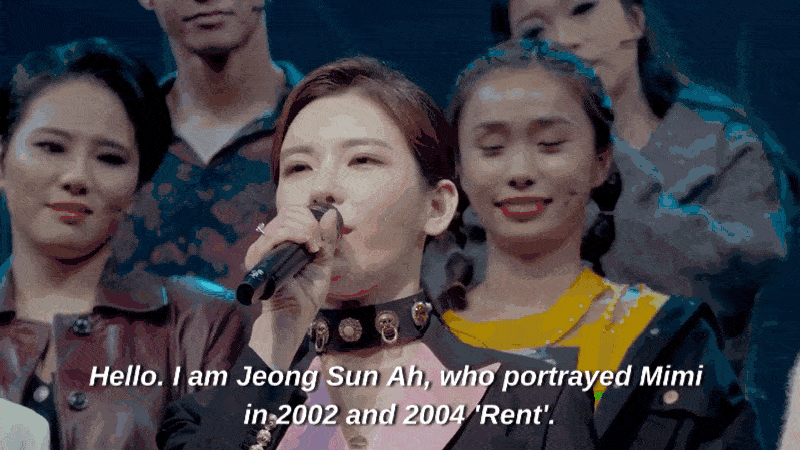
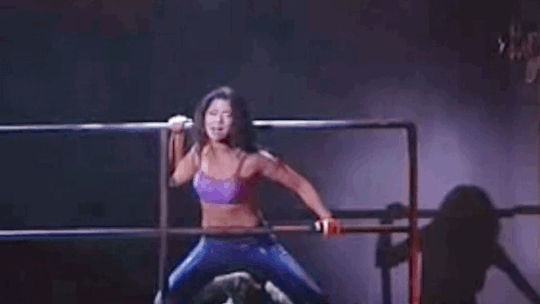
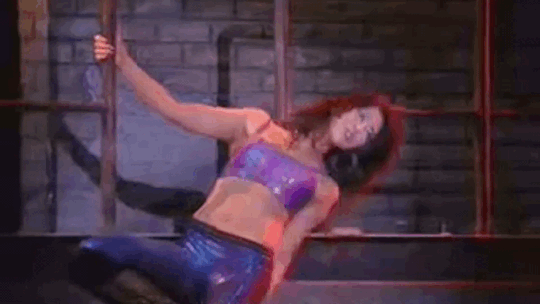

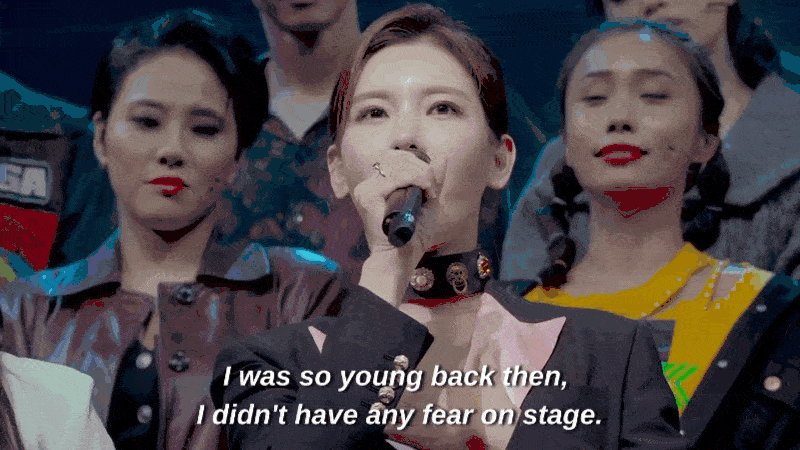

200705 렌트 Rent curtain call - Homecoming special [1] [2]
Hello. I'm Jeong Sun Ah, who portrayed Mimi in 2002 and 2004 ‘Rent’. As many people know, I was 18 years old when I portrayed Mimi. My dream [to be a musical actress] started after seeing Choi Jeong Won at the premiere of ‘Rent’. I was so young back then, I didn’t have any fear on stage. I am currently able to perform on stage happily because of [seniors] who were with me. I’m really thankful to be standing here with my seniors, colleagues and juniors.
29 notes
·
View notes
Text
New production photos? A’ight!
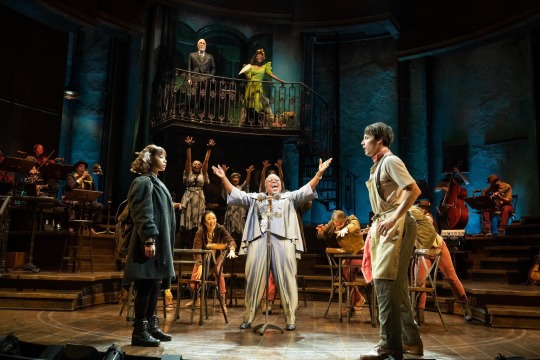
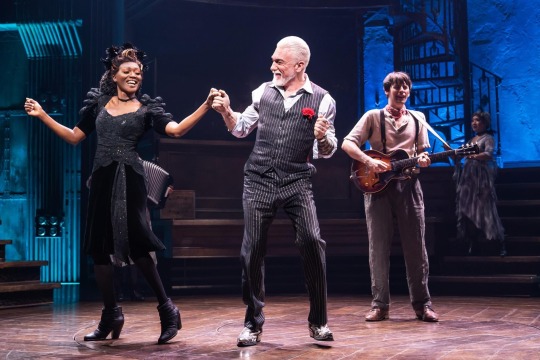

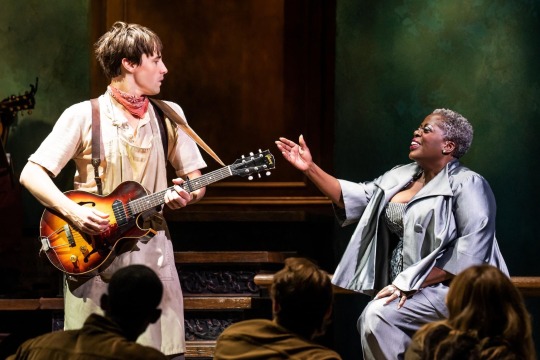
You know the drill, I stole them from Facebook:)
771 notes
·
View notes